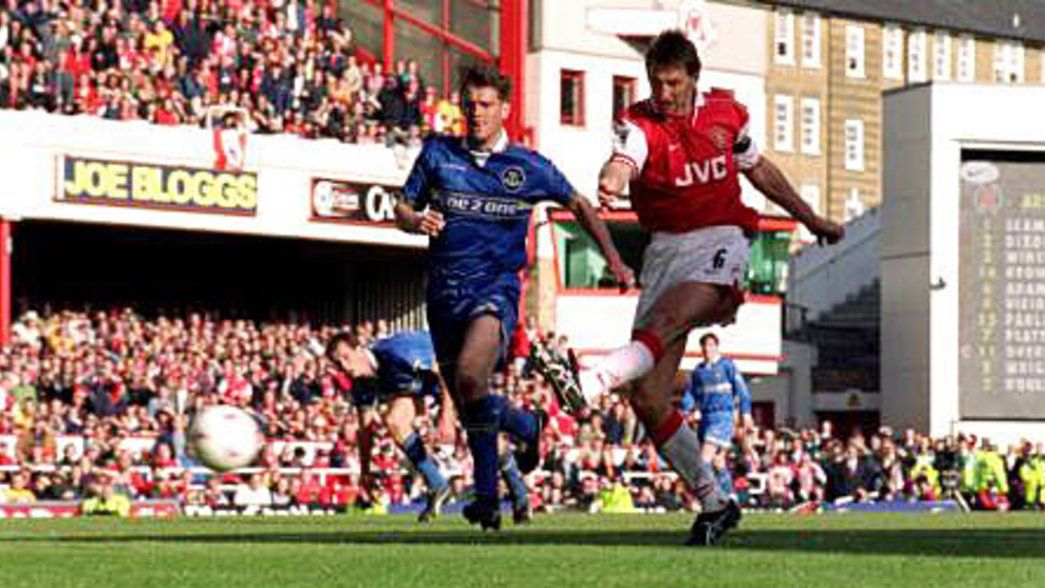Fourteen years as captain, 669 appearances and 10 major trophies, including League titles in three different decades. It's no surprise that 'Mr. Arsenal' himself is regarded as one of the Gunners' greatest ever players.
Adams was the ultimate one-club man - an increasing rarity in modern football - and a rock at the heart of Arsenal's defence. He thrived as the leader of the famous Back Four, developing an instinctive understanding with his centre-back partner Steve Bould and full-backs Lee Dixon and Nigel Winterburn. On an individual level, it's hard to think of a more committed, more gutsy and more inspirational footballer in Arsenal's history.
George Graham called him "my colossus"; Arsène Wenger described him as a "professor of defence". They were both right. Technically, Adams was a supreme defender - the timing of his tackles, his reading of the game and his aerial ability made him an awesome opponent. Add to that his insatiable appetite for a battle, his mental and physical resilience, his desire and, of course, his leadership, and it's easy to see why Adams was a hero to the Highbury faithful.
It was clear that Adams was a bit special from the moment he signed for Arsenal as a schoolboy in 1980. Three years later he made his debut against Sunderland, four weeks after his 17th birthday. It was hardly an auspicious start - Adams was partly to blame for a 2-1 home defeat - but he soon found his feet at the top level.
Eight months after winning his first medal at the 1987 Littlewoods Cup Final, Adams became Arsenal's youngest ever skipper at the age of 21. It was a position he would hold until his retirement but, in those early days of captaincy, Adams had to endure plenty of stick. The Daily Mirror famously depicted Adams with donkey ears the morning after he scored at both ends in Arsenal's 1-1 draw at Manchester United. Opposition fans soon latched on.
Adams' response was simple - he just pointed at his growing stack of medals. Eight weeks after his Old Trafford experience, the Arsenal captain led his team to the title on that famous night at Anfield. Two years later he had his hands on the same trophy and a domestic Cup Double would follow in 1993. The taunts continued - a spell in prison from December 1990 fuelled the fire - but Adams always seemed to have the last laugh.
He scored 48 goals during his Arsenal career and plenty of vital ones. The header which beat Tottenham at Wembley in 1993 will live long in the memory and another huge leap accounted for Torino in the Cup Winners' Cup Quarter-Final a year later. Adams was arguably at his peak during that European campaign. With David Seaman behind him and Bould alongside him, Adams and Arsenal were inpenetrable at times. Parma found that out in May 1994 as Adams lifted his first European trophy after a defensive masterclass.
By 1996 Adams was the England captain too but that year was dominated by revelations of his alcoholism. It proved a turning point on and off the pitch. Away from the action Adams matured and showed great dignity. On the field, the arrival of Wenger was perfectly timed. The Frenchman's focus on diet and preparation helped Adams fend off his old habits while Wenger's footballing ethos allowed the Arsenal skipper to express himself more on the pitch.
Whereas Graham had favoured a more direct style, Wenger encouraged Adams to be more expansive. He flourished, showing more poise in possession, initiating attacks from the back and even getting forward when he could. That approach manifested itself most emphatically on the final day of the 1997/98 season when Adams, put through by Bould (of all people), rifled a shot into the corner to put the top hat and tails on another title. Adams' celebration in front of an adoring North Bank remains one of the iconic moments in Arsenal's rich history. The FA Cup - and the Double - duly followed.
Now in his 30s, Adams was increasingly hampered by injuries but, like so many Arsenal greats, he managed to go out on a high note. In Adams' case it was another Double, this time in 2002, clinched in style with a win at Old Trafford. Would the Adams of old have been part of that triumphant squad? Perhaps not, but the great man's final flourish was just reward for turning his life around six years earlier.










